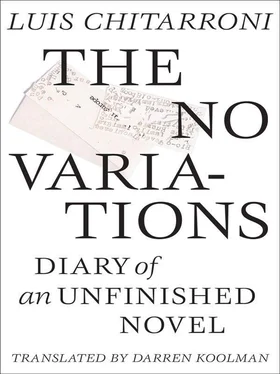We were living in the worst of times. The consul’s wife was having an affair with one of our superiors. Our superiors — Blamires, Haedo, and Haines — were more accomplices than associates. Haedo worked with us in our office. Blamires was the one who said we should always return the machines to their natural state of repose. Haines had his lover in his office, or perhaps it’s better to say, he made sure she was working with him in the same office. Molly was the one who took all the important phone calls, and addressed all five of us using the same submissive vocative: “my king.” Once, Gustavo asked her to call him “viceroy.” She was quite a curvaceous missionary, her hair dyed blond from raven black [I mean that without being funny].
We had three journals: one on cinema, one on music, and the other on rugby. At that time, I believed I knew a lot about the first two subjects and bragged about knowing nothing about the third. This was a cause of much hilarity for Haines, the one responsible for the rugby journal, just as Haines’s lover was, in turn, a cause of much hilarity for the “viceroy.” The journals didn’t produce any revenue. The trick was to deceive the advertisers about the distribution and prints runs, an art Blamires and Haedo were particularly adept at, while Haines did all the talking.
The product that really kept us afloat —and brought lucre to the publishers — was a book we had translated: Venus Cascabel . It was quite a small edition, twee. Felix, the layout designer, did his best to make them attractive, copying the original designs that were based on pulp fiction illustrations of the fifties. Felix’s skill was both a consequence of his extreme static perfectionism and his inability to draw dynamically (perhaps the two are one), which stood out in the first edition, but was enhanced with a vengeance after the success of the following three. Felix couldn’t have children, he always confused lemurs with [for] lemmings — thanks to which I won a bet: he had to buy us (Gustavo and me) a meal — [and he looked on with wistful resignation at the women’s butts, like one who is to be ordained to an abstinent office. NO]
The first volumes of Venus Rattlesnake were on a shelf next to Gustavo’s writing desk, each one with its corresponding translation. Gustavo was very organized. He read every copy in advance before sending them off to be translated. And he was a huge fan of Venus Rattlesnake, of Venus Cascabel …
Venus Rattlesnake — Venus Cascabel in the Spanish translation — an elegant woman and dedicated socialite, soon became the most important character in the everyday life of “the publishers.”
Under cover of daylight she was called Prunella Crane. She had a husband, two children, and a lapdog, Toon (Chasco, according to the local version). She was affiliated with many charitable organizations. She used to consult the tarot as well as dabbling in many other kinds of sortilege. She ran a small and exclusive cosmetics company, Liliata Rutilantium . The names of her husband — Adam Hapwood — and of her children — Silvia and Bruno — were irrelevant, [at the end of the day], but not Chasco’s, because, at the end of the day — literally, after nightfall — Chasco became Rascal (Rapáz, in our Spanish editions), and he ceased to be a mere lapdog, becoming instead a ferocious bandog, guarding her — Prunella, who at nightfall became Venus Cascabel — during her secret meetings at which someone’s execution was discussed, among other things; or accompanying her and her henchmen in taking part in “sanguinary orgies,” to quote our blurbs (the originals in English were anemic and overly descriptive). I transcribe the metaphorical enthusiasm of the early days: “As if it had been the sea, an orgy of sarcasm from which spawned two fish of human aspect.”
The first two episodes, Massacre in Hoboken and The Bullet in the Footprint , introduced Prunella’s ally and occasional enemy: the private detective, Tecumseh Talbot. Bearish and sullen in disposition, a womanizer by predilection, he was of Sioux or Shawnee extraction, and was plagued by odontological and intestinal problems. The masterful description of a toothache compares with that of the battle of the “serendips” [“sapajous” in the original] in The Clashing of Penknives in Brooklyn Heights , in which the Cascabel’s business affairs led to her arbitrating a dispute between gang members.
From the sixth or seventh issue, it was evident Venus had lost a lot of ground to Tecumseh. In the eight, Chicano Cocktail , a new character was introduced, Silveyra (thereafter called, without explanation, Silvero), who dominates most of the action in this most over-the-top and remiss of the novelettes. For this reason, it is said, Venus came to respect Silvero. Tecumseh, on the other hand, despised him “because he’d murdered two of the best.” In Orange Juice for One , my favorite, we discover that Venus’s apparent misgivings about Silvero were only a show. She’d been completely and unambiguously in love with him, “a gentleman of some fifty years, white-haired and elegant, a silver fox whose boundless gentility had been a flue for his criminal impulses.”
The original North American edition was published by Dout, a short-lived eighties version of Dell publishers (the eighties, decade of ephemera). Gustavo, editor of the local Spanish edition, had read the original English with gusto. But he noted one irregularity: The English series stops at issue sixteen, whereas our Spanish one keeps going, now with the garrulous tongue unrestrained. When I began working at Beehaitchhaitch, we were about to print issue twenty-one.
Sad Skin of the Universe:
I can’t use Tecumseh (whom I cribbed from Wilson’s Patriotic Gore ), because Rex Stout (whom I know through Nero Wolfe) has a second investigator by the name of Tecumseh Fox. But the coincidence is worth the trouble, I so loved Nero.
And if the investigator was English? What would an Englishman be doing there? It is characteristic of the English, as Stevenson notes, to always be there. Verisimilitude (Brother Gerundio, Brother Gozne, Brother Alpe) …
Antagonist of the last chapter: Regina Constrictor.
On considering these variants: Prosan’s point of view, that of a woman who was in love with Nurlihrt (Prosan seems to have had the [good] fortune to know her), and from the point of view expressed by Nurlihrt himself — whom the woman in question, while seated in a canvas chair [taking in the sun], had interviewed the day before. From what I could gather, Lester wasn’t very impressed. But Prosan’s enthusiasm didn’t need encouraging. I recall meeting Nurlihrt about three months afterwards (the second-last time I saw him), before he’d closed down his office. He rejected the story, telling Lester it was “an incredibly banal version of Rashomon,” and invited the “wheedler” (Lester) to try dissuading the author, who was obsequiously willing to rewrite the whole thing. Although I can attest to Prosan’s scrupulous literality, it’s obvious he hadn’t detected in the writer’s monologue the same superabundant, highfalutin prose, the same tautologies, the same gimmicky hallmarks the senile founder of Agraphia exhibited to a journalist he was one day going to marry. There are so many errors, anachronisms, and stylistic defects in this bathetic rubbish, but I vow to shut up as long as it’s not included in the volume. It would save us having to waste the whole budget in bowing to your request for a “thorough edit and correction of the volume.”
People so complacent they haven’t prepared their spouses for the prospect of abandonment. Predominance of cruelty. Predominance of self-reproach.
Читать дальше












